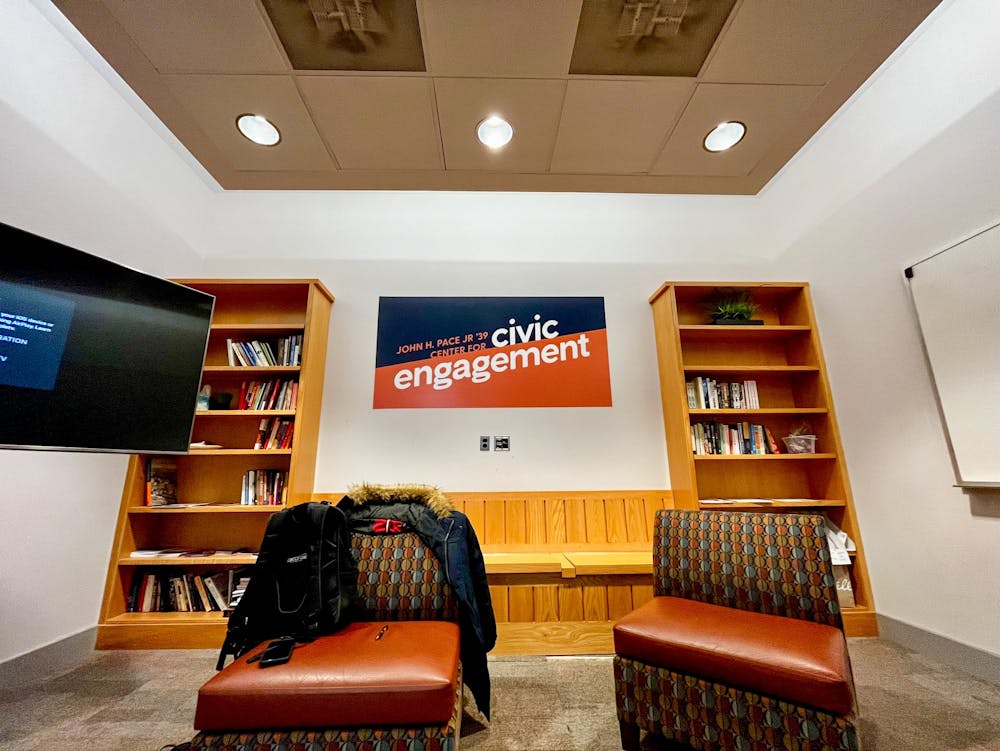Every year, Princeton's Center for Career Development publishes the “initial destinations” of the graduating class. The Daily Princetonian broke down the post-graduation destination data from the Classes of 2016 to 2022 collected by the Center for Career Development.
The data demonstrates a significant increase in students going to graduate school, and fewer students starting their career in New York.
The Center for Career Development splits professions into five major industries. Around 30 percent of Princeton alumni enter the business industry each year. The engineering, health, science, and technology category is the second most popular destination for alumni, with close to 25 percent entering the industry.
Social impact is consistently the third most popular industry for recent graduates, with 13 percent of the Class of 2022 going into the field.
Princeton grads are least likely to enter the legal sector and arts and entertainment sector directly out of undergrad. This proportion has also shrunk by half in recent years, with five percent of graduating seniors in 2021 and 2022 joining the arts and entertainment field, down from eight percent of the Classes of 2016 and 2017.
From PICS to service and government work
While at Princeton, students looking for opportunities to work in the nonprofit sector often turn to Princeton’s Internships in Civic Service (PICS), which connects community partners with student-interns.
A program started by alumni in 1996, PICS works with the John H. Pace, Jr. ’39 Center for Civic Engagement to provide paid internships in nonprofit organizations to Princeton undergraduates.
Class of 1969 PICS Program Director Emily Sharples wrote in an email to the ‘Prince’ that PICS community partners “routinely praise PICS interns for their professional demeanor, inquisitive nature and curiosity, helpfulness, and willingness to ask questions.”
Over 25 percent of newly hired Princeton-educated employees each year accept service and government jobs. The Class of 2021 had the highest rate of working in service and government with nearly 30 percent of the class doing so.

Executive Director of Princeton in Africa Damilola Akinyele told the ‘Prince’ in an interview that having PICS interns has been “a great service for [the organization] and nothing but a good experience.” The organization matches over 700 college graduates with fellowships abroad in 37 different African countries.
“This is critical work — this summer, our two PICS interns worked closely with us, creating communication materials that we could put out, researching for ways to advance the organization, and helping out with the fellows,” she said.
Lorraine Goodman, Director of Advancement for the Big Brothers Big Sisters of Mercer County, shared similar enthusiasm for working with Princeton students. Goodman told the ‘Prince,’ “We had an intern who was the perfect example of a PICS intern and what a PICS internship can do for students.”
“There is a lack of resources that so many of the kids we work with experience,” Goodman added. “Having a big sister or big brother — which is such a small thing — can really change their life.”
PICS Vice Chair Kate Bellin wrote in an email to the ‘Prince’ that “alumni are always thrilled to help connect students to organizations that are doing exciting work in areas ranging from government agencies to nonprofits to art institutions and hospital systems.”
The path to graduate school
More graduates are choosing to pursue higher education directly after undergrad. From 2016–2019, around eight percent of each graduating class entered master’s programs and around seven percent entered doctoral programs.
Since 2019, the percentage of graduates pursuing master’s degrees directly after graduation has risen. This rise is most drastic for the Class of 2021 and the Class of 2022, where 14 percent of each class continued their studies into master’s programs.
Of those continuing their studies, the percentage who stayed at Princeton has nearly tripled from the Class of 2020 to the Class of 2021.
17 percent of those pursuing graduate work in the Class of 2021 and 21 percent of those pursuing graduate work in the Class of 2022 remained at Princeton, compared to a six-percent average of the Classes of 2016–2020.
The rise in students remaining at Princeton has been driven by engineering majors pursuing master’s degrees. The Engineering School recently introduced a one-year master’s program which has at time been free of charge, popular with current undergraduates during COVID-19.
The least common paths for Princeton students pursuing higher education directly after graduation are law school and medical school — only one percent and two percent of each class enter these programs, respectively.
Where in the world are Princeton grads?
Nearly a third of new alumni go to New York for the beginning of their post-Princeton lives, although this trend has been declining in recent years. 34 percent of alumni from the Class of 2016 called New York State their first destination after graduation, compared to less than 27 percent of alumni from the Class of 2021.
Around 14 percent of new graduates move to California each year. Internationally, Britain and the U.K. are the most common first destinations for graduating seniors.
Throughout 2016–2022, Ecology and Evolutionary Biology and History are the only Princeton departments whose graduates have moved to all continents, except for Antarctica, after graduation. Politics, School of Public and International Affairs, and Sociology majors follow closely behind in terms of geographic diversity, pursuing opportunities in all continents besides Australia and Antarctica.
In contrast, no Electrical and Computer Engineering (ECE) majors within the past six years left the continental United States for their first destination. 33 percent of ECE majors from the past six years remained in New Jersey.
Jocelyne Wijaya is a News contributor at the ‘Prince.’
Erin Yoo is a Data contributor at the ‘Prince.’
Please send corrections to corrections[at]dailyprincetonian.com.








